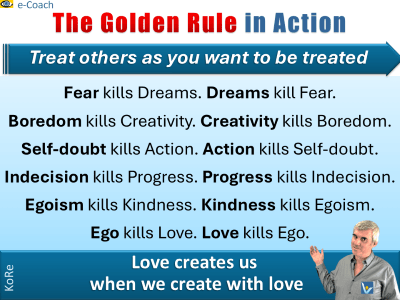| |
The Golden Rule
was formulated in
Confucianism as 'Do unto others as
you would have them do unto
you'.
It is a
universal principle found in
various cultures and religions.
Today, many organizations
formulate their own Golden
Rules.
|
|
 |
| |
|
Google's
10 Golden Rules
By: Eric Schmidt and Hal Varian
|
|
|
| |
At Google, we think business guru
Peter Drucker
well understood how to manage the new breed of "knowledge
workers." After all,
Drucker invented the term in 1959. He says
knowledge
workers believe they are paid to be effective, not to work 9 to 5, and that
smart businesses will "strip away everything that gets in their knowledge
workers' way." Those that succeed will attract the best performers, securing
"the single biggest factor for
competitive advantage in the next 25 years."
At Google, we seek that advantage.
The ongoing debate about
whether big corporations are mismanaging
knowledge workers is one we take
very seriously, because those who don't get it right will be gone. We've
drawn on good ideas we've seen elsewhere and come up with a few of our own.
What follows are ten key principles we use to make knowledge workers most
effective. As in most technology companies, many of our employees are
engineers, so we will focus on that particular group, but many of the
policies apply to all sorts of knowledge workers. |
| |
①
Hire by Committee
Virtually every
person who interviews at Google talks to at least half-a-dozen
interviewers, drawn from both management and potential colleagues.
Everyone's opinion counts, making the hiring process more fair and
pushing standards higher. Yes, it takes longer, but we think it's worth
it. If you hire great people and involve them intensively in the hiring
process, you'll get more great people. We started building this
positive
feedback loop
when the company was founded, and it has had a huge payoff. |
| |
②
Cater to their every need
As
Drucker says, the goal is to "strip away everything that gets in their
way." We provide a standard package of fringe benefits, but on top of
that are first-class dining facilities, gyms, laundry rooms, massage
rooms, haircuts, carwashes, dry cleaning, commuting buses – just about
anything a hardworking engineer might want. Let's face it: programmers
want to program, they don't want to do their laundry. So we make it easy
for them to do both. |
| |
③
Pack them in
Almost every
project
at Google is a
team project, and
teams have to
communicate. The best way to make
communication easy is to put team members within a few feet of each
other. The result is that virtually everyone at Google shares an office.
This way, when a programmer needs to
confer with a colleague, there is
immediate access: no telephone tag, no e-mail delay, no waiting for a
reply. Of course, there are many conference rooms that people can use
for detailed discussion so that they don't disturb their office mates.
Even the CEO shared an office at Google for several months after he
arrived. Sitting next to a knowledgeable employee was an incredibly
effective educational experience.
Next →
④⑤⑥⑦⑧⑨⑩ |
 |
We want to build technology
that everybody loves using, and that affects everyone. We want to create
beautiful, intuitive services and technologies that are incredibly useful. |
Larry Page
Google |
|
|